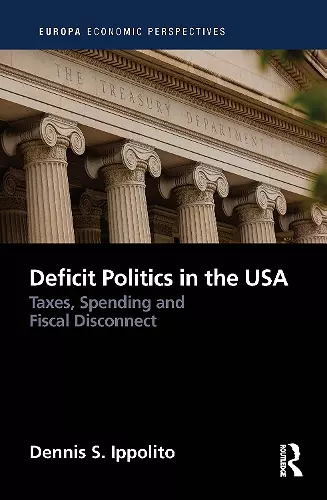Deficit Politics in the United States
Taxes, Spending and Fiscal Disconnect
Format:Hardback
Publisher:Taylor & Francis Ltd
Published:23rd Feb '22
Currently unavailable, and unfortunately no date known when it will be back
This hardback is available in another edition too:
- Paperback£42.99(9781032201245)

From the clashes between Federalists and Republicans in the 1790s until today, partisan battles over taxing, spending, and public debt have shaped American political development. These battles were formerly constrained by fiscal norms that mandated balanced budgets and low debt. In his Farewell Address, President George Washington counseled the nation to "cherish public credit" by using "it as sparingly as possible".
In the 1980s, however, tax cuts and spending increases created large structural deficits and much higher debt levels. With only a brief interruption in the late 1990s, deficit politics has been a mainstay ever since.
Over this period, the Republican Party has passed large tax cuts but failed to retrench the large entitlement programs that continue to raise spending. Likewise, the Democratic Party has expanded the domestic role of government but has abandoned the broad-based taxation it supported in the 1990s. Funding their domestic agenda with matching revenues is now as unappealing for Democrats as entitlement cutbacks are for Republicans, contributing to the current stalemate of Republican tax policy, Democratic spending policy, and soaring deficits and debt. The economic risks this entails are serious, yet an end to the era of deficit politics is nowhere in sight.
Ippolito (Southern Methodist Univ.) provides an exceptionally detailed account of the political debates over US fiscal policy from the nation's founding to the Trump era. As the title implies, the book weaves together the political and economic history of the United States. Ippolito reminds readers that an aversion to public debt characterized the first 150 years of US history. Unprecedented deficits since then—caused by low taxes and high spending—were grudgingly accepted and budget surpluses became rare. Ippolito emphasizes that a seemingly permanent bipartisan consensus—that debt should finance increases in public spending—now controls fiscal policy. The result is that “voters need not decide how big a government they are willing to pay for.” Ippolito augments the narrative with well-placed tables derived from primary sources and presented in a style and format that are consistent regardless of the period covered or the specific policy context examined. Social historians, political scientists, economists, and public policy scholars will want to keep this volume handy for its historical context, vital for any number of scholarly purposes.
--J. E. Herbel,Kennesaw State University, CHOICE
ISBN: 9780367765064
Dimensions: unknown
Weight: 594g
224 pages